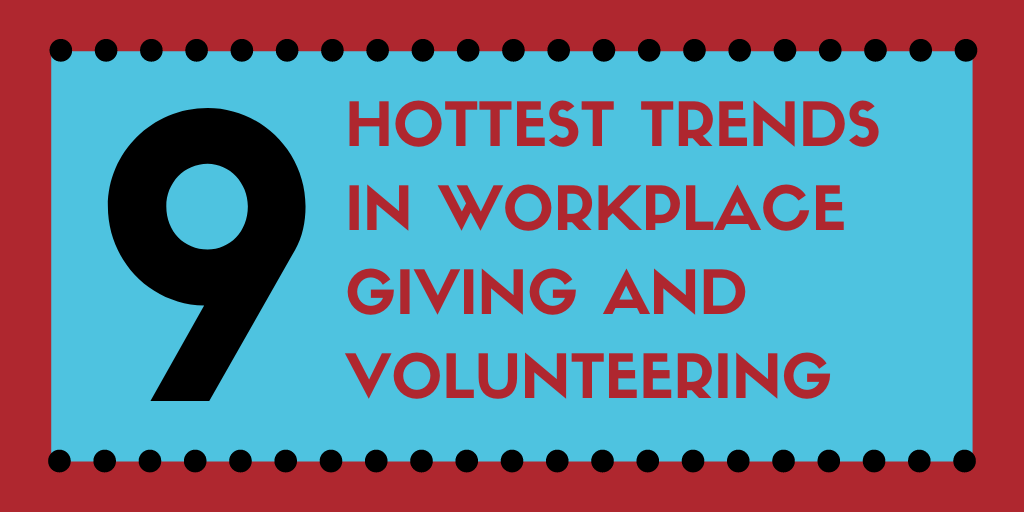
Earlier this fall, Chris Jarvis, Co-founder and Chief Strategy Officer at Realized Worth, and Elizabeth Dove, Director of Corporate Citizenship at Volunteer Canada, hosted a ChangeMakers@Work webinar on the most exciting emerging trends in workplace giving and volunteering.
1 – Merging all employee community activities
To better support what employees see as their individual social responsibility, companies are increasingly combining service, giving, learning, and support for other forms of civic engagement under one umbrella of employee community engagement. This allows employees to choose from a variety of ways to get involved in the community, fosters a holistic, year-round approach to community engagement, and makes room for more creative opportunities to give back. Challenges with this trend are telling stories and finding employee engagement managers with the skills and competencies to support all forms of engagement.
2 – Doing and learning
Based on cognitive processes, companies are building in an intentional process for employees to reflect on their volunteer activities, turning them into learning opportunities. When people have new experiences that change their perspectives, their brains grow new synaptic pathways, changing the way they think and behave. Before employees start volunteering, they should know the importance and impact of the task at hand. During and after the event, employees need time to reflect so they can learn the meaning of the experience. That awareness makes employees more inclusive, compassionate, and empathetic – creating better employees, companies, and communities.
3 – Learning and deferred doing
Recognizing the potential of intentional learning, companies like TD and RBC are encouraging employees to visit community organizations, listen to speakers from the community, or participate in reading groups instead of volunteering. These learning opportunities allow employees to understand someone’s everyday lived experience and the challenges in the community – and to reflect on solutions. In addition to being a solution to the limited number of volunteer opportunities available for large groups, these activities can make employees more intentional and thoughtful about their volunteering, giving and civic engagement.
4 – Social and environmental hackathons
Hackathons are competitions where teams of employees propose innovative solutions to pressing social or environmental concerns. The best hackathons include a learning component to educate employees on the issue. Winners are often chosen Dragon’s Den style and get company time and finances to bring their idea to life. Examples include Deloitte Canada’s multi-country hackathon for good and SAP’s One Billion Lives initiative.
5 – Skills-based volunteering
Skills-based volunteering allows volunteers to learn new skills through volunteering or to apply specialized skills to a volunteer role. Since you have to match the right skills to the right need, this type of opportunity cannot be rolled out uniformly across a company. Skills-based opportunities are often time intensive, so some companies incorporate them in their leadership development programs. Agencies like Taproot or Endeavour can help match skills to needs and provide support throughout the process.
6 – Making space for employee choice
Programs like Dollars for Doers, paid time off to volunteer and donation matching can offer employees the flexibility to support the causes and community organizations that are important to them, rather than only focusing on company-directed causes. Giving employees the power to decide what to support increases employee engagement and business outcomes.
7 – Making peace with measurement
Giving employees lots of choice in community engagement has many benefits, but it can also be challenging to track and measure the impact of their activities. However, employees that are better global citizens are, in and of themselves, an enormous contribution to society. The related impacts of increased employee connection to the community and company, their improved well-being, and new skills offer some measurable benefits.
8 – Helping company stakeholders give back
Some companies include family members, retirees, vendors, suppliers and customers in their community engagement programs. These expanded programs build and enhance relationships with stakeholders and the community, and help smaller companies learn alongside bigger companies. The Airbnb Open Homes program is a great example of a company giving stakeholders an opportunity to give back.
9 – Making room for changes in employee social consciousness
When employee community engagement is done well, it turns employees into better-informed global citizens. These employees then look at the world, including their workplace, and see what needs to change. Companies like Coca-Cola make room for diverse ideas and create intentional spaces for employees to express their concerns about business operations and suggest solutions.
Workplace giving and volunteering is a powerful way for businesses to create positive change in the community. Demand for corporate community engagement continues to grow among Canadian consumers and employees, with 68% of Canadians saying that, given the choice between two jobs, they would choose the one at the company with the stronger volunteering culture (2017 Volunteer Canada and Ipsos Public Affairs).
Learn how compassion builds better companies, how to build lasting employee engagement, and more about corporate citizenship.
